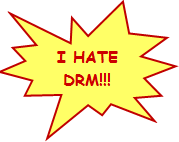The idea of "Open Source DRM" makes me want to vomit with rage

What do you do if you're in charge of a company that has enthusiastically embraced DRM, but you later discover that the abbreviation is even more hated that words such as plague, hemorrhoids or Vista? Simple, grab a word or phrase that gives people a warm-fuzzy feeling, like maybe "open source."

The marlin website is filled with phrases such as "content sharing platform" and "simple, open, and elegant solution for powerful content services" crafted to try to make you feel good about DRM, in fact, feel like you're getting something extra compared to those folks who download their music from the Amazon MP3 store.
Talal Shamoon, co-chairman of the Marlin Developer Community, is filled with glowing praise for the project.
"It works in a way that doesn't hold consumers hostage."
"It allows you to protect and share content in the home, in a way that people own the content, not the devices."
"With Marlin, any device that runs Marlin can run content on the home domain It's a level playing field [for manufacturers] - they don't have to go up to Redmond with a begging bowl or suck up to Steve Jobs."
And my favorite quote of all:
"Make DRM invisible and people will use it."
OK, I'm now seconds away from the vomit with rage stage.
OK, some advice for Marlin. People don't want DRM. People either don't know about it, tolerate it or circumvent it. A more accurate statement would be that that if you "make DRM invisible and people will use it without knowing about it" or "make DRM invisible and people will be forced to use it."
Also, there's no "level playing field" for the consumer. All Marlin does is allow several companies to come together to compete against the likes to Apple and Microsoft. Yes, maybe is gives Sony and Samsung and the other involved a level playing field, but I can't see much in that for the consumer. The two big players in content (Apple and Microsoft) are unlikely to adopt this DRM scheme anyway, so what you end up with is more, and more fragmented DRM schemes. This just results in people left hanging when support for the DRM mechanism is dropped.
Rant over ...
Thoughts?